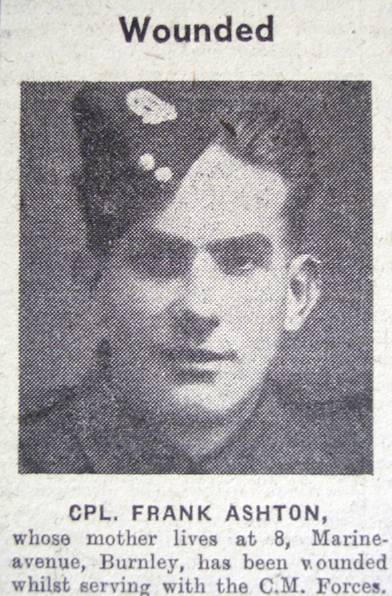 Middlesex Regiment.
Middlesex Regiment.
Awarded the Military Medal in the Supplement to the London Gazette 15 June 1944.
The original recommendation (which was for an immediate award of the Distinguished Conduct Medal) states:
"For conspicuous gallantry and devotion to duty near Carrocceto in the Anzio beachhead.
Throughout the night of 3-4 February 1944, this N.C.O., who was acting as No. 1 gun number in the Machine-Gun Platoon, continually engaged opportunity targets and by so doing, kept the enemy on the move and prevented his forming up for the attack. On two occasions the skilful way in which he directed his fire halted enemy attempts to advance.
After first light he concentrated on enemy M.G. posts which had been established during darkness, accounting for six, and later for a further two.
From 1030 hours onwards his platoon was isolated from other troops, and his gun was in a very exposed position, and when his section commander became a casualty, he assumed command, at the same time continuing to fire his gun.
By 1400 hours his ammunition was practically exhausted, and he then engaged the enemy with a rifle, and when his platoon was withdrawn at 1830 hours, he was the last man to leave the position.
For about 24 hours he had kept his gun in action under very heavy small arms and artillery fire, and during this time his accurate and skilfully directed fire inflicted severe casualties on the enemy.
His behaviour was exemplary and he showed complete disregard for his personal safety."
Frank Ashton, who was born in Burnley, Lancashire in December 1920, enlisted in the 2/7th Battalion, Middlesex Regiment (Territorials) in April 1939, was mobilised that September, and remained on duty in the U.K. until being embarked for North Africa in May 1943. Subsequently embarked for Anzio, Ashton was severely wounded by shrapnel on 23 February 1944, a few days after his M.M.-winning exploits, and was evacuated to 93 General Hospital with injuries to his right leg, right arm and left buttock. But he had recovered sufficiently by August to rejoin his Battalion in the Field, and also went on to serve in Egypt and Palestine before being re-embarked for England in March 1946.
.